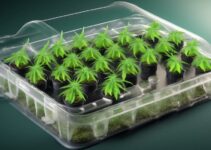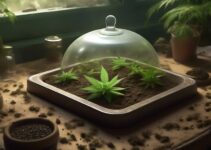Having carefully selected and purchased your cannabis seeds, you eagerly planted them, only to find that they failed to sprout. Frustrating, isn't it? But fear not, there are several factors that could be contributing to this issue. Understanding these potential reasons can help you troubleshoot and improve your germination success. From the quality of the seeds to the conditions in which they were stored, each aspect plays a crucial role in the germination process. Let's explore the various factors that may be affecting the sprouting of your cannabis seeds and how you can address them to ensure successful germination.
Key Takeaways
- Quality seeds and proper storage conditions are essential for successful germination.
- Correct handling and planting techniques, such as the right planting depth and soaking seeds in water, can improve germination rates.
- Maintaining optimal temperature, light exposure, and air circulation is crucial for healthy seedling development.
- Proper watering and moisture levels are important to prevent overwatering and ensure successful germination.
Equipment and Tools for Germination
To ensure successful cannabis seed germination, it is essential to utilize specific equipment and tools designed to optimize the germination process. Start with quality seeds. Look for dark, firm, and high-quality cannabis seeds. The Seed Germination Kit provides trays, cotton pads, labels, and instructions for turning seeds into seedlings. A propagator is an excellent tool to create the ideal environment for germination, increasing the chances of success. Consider using Seedbooster Plus (Plagron), a germination accelerator that speeds up the process and improves germinability. Additionally, the Spongepot, an organic medium for germination and rooting seeds, is ideal for both beginners and serious gardeners. The Seedbox Germination Kit (Plagron) is a complete tool equipped with a tray, plugs, seed booster, and a user guide for optimal germination. Remember to provide the right amount of water, ensuring the soil remains moist but not waterlogged. Light is also crucial during the germination process. Ensure that the seeds receive the right amount of light to trigger germination. By utilizing these tools and equipment, you can optimize the germination process and enhance the success of your cannabis seed germination.
Seed Quality and Storage Conditions
Proper storage conditions are crucial for maintaining seed viability and optimizing germination success. When storing your seeds, it's important to keep them away from light, extreme temperatures, and humidity. For long-term storage, consider refrigeration to maintain the seeds' quality. Sourcing cannabis seeds from reputable seed banks is essential to ensure good quality seeds with higher germination rates. This will ultimately lead to better plant health and higher yields at harvest time. Trusting seeds from reliable sources is particularly crucial for beginner growers, as bargain or mystery seeds may have low germination rates, leading to frustration and wasted time and effort. Additionally, handling seeds with clean gloves and disinfected tweezers minimizes contamination risks and reduces the likelihood of seed spoilage. Using sterilized soil for planting and clean containers for potting will also help prevent damping off and other diseases, ensuring optimal conditions for germination.
| Storage Conditions | Seed Quality | Seed Banks | Beginner Growers |
|---|---|---|---|
| Away from light, extreme temperatures, and humidity | Sourced from reputable seed banks | Ensure good quality seeds | Crucial for better results |
Correct Handling and Planting Techniques
When handling cannabis seeds for planting, ensure that they are placed at the correct depth of 0.2-0.4 inches and lightly covered with soil to facilitate successful germination. Failure to plant seeds at the appropriate depth can result in the seeds not germinating. It's important to make sure you're using sterilized soil and clean containers to prevent damping off and other diseases, as these can hinder the germination process. Additionally, soaking seeds in water before planting can help to begin the germination process and promote successful sprouting. Providing the right conditions, such as maintaining an optimal temperature of 20-25°C, is crucial for the seeds to germinate. Gradual light exposure to emerging seedlings is also necessary for healthy growth. Furthermore, preventing pests from damaging seeds is essential. Using bird netting, ant traps, neem oil, and regularly inspecting for infestations can help safeguard the seeds. Prioritizing quality over quantity by providing adequate space for root growth and avoiding overcrowded pots is fundamental. Choose the right number of plants based on available space and resources to ensure the seeds germinate properly.
Watering and Moisture Levels
You need to ensure proper seed moisture to support germination. Overwatering can lead to drowning of the seeds and limit the supply of oxygen essential for the process. It's crucial to establish an ideal watering schedule to avoid the risks associated with both under and overwatering.
Proper Seed Moisture
To maintain optimal seed moisture levels, it is important to ensure that the soil is consistently moist, but not waterlogged, in order to support successful germination and early growth. When managing proper seed moisture, consider using a spray bottle to mist the soil, maintaining moisture without overwatering. Watch for the soil to dry out completely, as it can hinder germination. Additionally, monitor the soil moisture regularly to ensure it's conducive to seed germination. It is crucial to prevent seeds from being too deep in the soil, as this can impede the germination process. Soaking seeds in water before planting can be an effective germination method, but ensure that the soil moisture is balanced and provides ample space for the seeds to germinate and access the levels of nutrients they require.
Overwatering Risks
Proper control of moisture levels is critical to prevent the drowning of seeds and ensure an adequate oxygen supply during the germination process. Overwatering can lead to a lack of air in the soil, hindering the germination process. It is essential to maintain proper drainage and moisture levels in the soil to avoid overwatering. For the paper towel method, ensure that the paper towels are moist but not dripping wet to prevent overwatering the seeds. Additionally, cannabis seeds require a neutral pH between 6–7 for optimal nutrient uptake during the germination process. Here's a table to illustrate the risks of overwatering:
| Overwatering Risks |
|---|
| Drowning of seeds |
| Hindered oxygen supply |
| Lack of air in soil |
| Hindered germination process |
| Nutrient uptake issues |
Ideal Watering Schedule
Maintain a consistent watering schedule and monitor moisture levels to prevent overwatering risks and support optimal germination and seedling growth when discussing the ideal watering schedule for cannabis seeds.
- Proper watering frequency: Avoid overwatering or underwatering your cannabis seeds, and maintain a consistent watering schedule.
- Moisture levels: Keep the soil consistently moist but not waterlogged to support germination and seedling growth.
- Avoid waterlogged soil: Overwatering can lead to suffocation of the seeds and hinder germination, so ensure proper drainage in the soil.
- Monitor soil moisture: Use a moisture meter or regularly check the soil's moisture level to ensure it's within the ideal range for seed germination.
Environmental Factors Affecting Germination
To ensure successful cannabis seed germination, you must carefully regulate the temperature and light exposure in your germination environment. Maintaining an optimal temperature between 70-85°F (21-29°C) and providing 18 hours of light per day will promote successful germination. These environmental factors play a crucial role in the early stages of seedling development and must be carefully managed for successful sprouting.
Temperature and Germination
Maintaining an optimal temperature range of 20-25°C is crucial for promoting successful cannabis seed germination, as high temperatures can impede growth and development, potentially resulting in stunted progress. When germinating cannabis seeds, it's important to control the temperature to ensure successful outcomes. Here are some key points to consider:
- Ensure the temperature remains between 20-25°C for optimal germination.
- Use fans or open windows to cool down the indoor germination environment if it becomes too warm.
- Avoid setting plants outside too early in cold temperatures, as this can hinder the germination process.
- Be cautious of exposing seeds to too much direct sunlight, as this can decrease the likelihood of successful germination.
Light and Germination
In cannabis seed germination, controlling light exposure is critical for promoting successful outcomes and ensuring optimal environmental conditions for growth and development. When seeds germinate, they rely on the energy stored within them, and light is a key factor in triggering this process. Ideal light conditions for germination should be indirect and of low to medium intensity. Exposing seeds to high-intensity light can have a detrimental impact, inhibiting germination. The duration of light exposure is also important; typically, providing 16-18 hours of light is beneficial, but darkness is equally crucial. Darkness allows the seeds to respire and prevents them from drying out. Ensuring the right balance of light and darkness is essential for the successful germination of seeds and the healthy development of seedlings into robust plants.
Soil Preparation and Medium Selection
Properly prepared soil plugs, crafted from top-quality peat moss and coco coir, are essential for ensuring successful germination of cannabis seeds. When preparing the soil and selecting the growth medium, consider using Easy Start pods or Starter Kits that come with sterilized soil enriched with beneficial bacteria, as this simplifies the germination process. Additionally, the quality of seeds from reputable seed banks, such as Royal Queen Seeds, can significantly impact germination rates and overall plant health. It's crucial to use sterilized soil for planting to prevent diseases, as old or reused soil may contain mold and harmful organisms. Furthermore, proper planting depth and soil/pot sterilization are essential for successful germination.
To germinate your seeds, consider soaking them in water or using damp paper towels. When handling the seeds, ensure to use clean, bare hands to prevent contamination. After preparation, plant the seeds directly into the soil or potting mix, ensuring the medium is moist but not waterlogged. If using tap water, let it sit for 24 hours to allow chlorine to dissipate, as chlorine can inhibit seed germination. By carefully selecting the grow medium and following proper soil preparation techniques, you can greatly increase the likelihood of successful germination and healthy plant growth.
Troubleshooting Germination Issues
If encountering issues with cannabis seed germination, carefully assess the environmental conditions and seed quality to identify potential factors affecting the process. Troubleshooting germination issues requires a systematic approach. Ensure that the seeds are from a reputable source and have been stored properly. Check for signs of damage or poor quality. Soaking seeds in water before planting can help kickstart the germination process, but be cautious as over-soaking can lead to issues. Ensure that the soil is well-draining and not waterlogged, as excess water can suffocate the seeds and cause them to rot. Additionally, the soil can overpower the seeds if it's too compacted, making it difficult for the plant to grow. Adequate temperature control and light intensity are crucial for successful germination. Pests can also hinder the process, so it's important to monitor and prevent any potential infestations. Proper sterilization of pots and consideration of planting depth are also essential. By meticulously troubleshooting these factors, you can enhance the likelihood of successful cannabis seed germination.
Frequently Asked Questions
What Do I Do if My Seeds Don't Sprout?
If your seeds don't sprout, assess seed viability and consider proper germination techniques. Check seed storage, environmental factors, and seedling care. Ensure seedling nutrition, protect from pests and diseases, and handle transplanting carefully for successful growth.
Why Aren't My Seeds Coming Up?
If your seeds aren't coming up, check the seed quality, watering technique, soil composition, temperature control, seed depth, humidity levels, air circulation, seed age, and storage conditions. These factors all impact successful germination.
When Seeds Fail to Germinate?
If your cannabis seeds fail to germinate, it could be due to various factors such as seed quality, watering technique, soil type, temperature control, seed age, humidity levels, germination method, seed storage, and pests and diseases.
Do Cannabis Seeds Need Sunlight to Sprout?
Cannabis seeds do not need sunlight to sprout. Ensure proper soil moisture, seed viability, temperature control, seed depth, seedling care, nutrition, environment, and protection. Consider using seedling growth hormones for optimal results.





